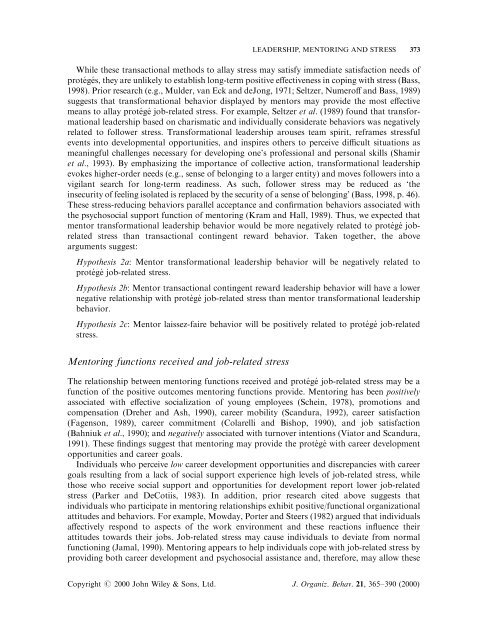Leadership styles, mentoring functions received, and job-related stress
Leadership styles, mentoring functions received, and job-related stress
Leadership styles, mentoring functions received, and job-related stress
You also want an ePaper? Increase the reach of your titles
YUMPU automatically turns print PDFs into web optimized ePapers that Google loves.
LEADERSHIP, MENTORING AND STRESS 373<br />
While these transactional methods to allay <strong>stress</strong> may satisfy immediate satisfaction needs of<br />
prote ge s, they are unlikely to establish long-term positive e€ectiveness in coping with <strong>stress</strong> (Bass,<br />
1998). Prior research (e.g., Mulder, van Eck <strong>and</strong> deJong, 1971; Seltzer, Numero€ <strong>and</strong> Bass, 1989)<br />
suggests that transformational behavior displayed by mentors may provide the most e€ective<br />
means to allay prote ge <strong>job</strong>-<strong>related</strong> <strong>stress</strong>. For example, Seltzer et al. (1989) found that transformational<br />
leadership based on charismatic <strong>and</strong> individually considerate behaviors was negatively<br />
<strong>related</strong> to follower <strong>stress</strong>. Transformational leadership arouses team spirit, reframes <strong>stress</strong>ful<br />
events into developmental opportunities, <strong>and</strong> inspires others to perceive dicult situations as<br />
meaningful challenges necessary for developing one's professional <strong>and</strong> personal skills (Shamir<br />
et al., 1993). By emphasizing the importance of collective action, transformational leadership<br />
evokes higher-order needs (e.g., sense of belonging to a larger entity) <strong>and</strong> moves followers into a<br />
vigilant search for long-term readiness. As such, follower <strong>stress</strong> may be reduced as `the<br />
insecurity of feeling isolated is replaced by the security of a sense of belonging' (Bass, 1998, p. 46).<br />
These <strong>stress</strong>-reducing behaviors parallel acceptance <strong>and</strong> con®rmation behaviors associated with<br />
the psychosocial support function of <strong>mentoring</strong> (Kram <strong>and</strong> Hall, 1989). Thus, we expected that<br />
mentor transformational leadership behavior would be more negatively <strong>related</strong> to prote ge <strong>job</strong><strong>related</strong><br />
<strong>stress</strong> than transactional contingent reward behavior. Taken together, the above<br />
arguments suggest:<br />
Hypothesis 2a: Mentor transformational leadership behavior will be negatively <strong>related</strong> to<br />
prote ge <strong>job</strong>-<strong>related</strong> <strong>stress</strong>.<br />
Hypothesis 2b: Mentor transactional contingent reward leadership behavior will have a lower<br />
negative relationship with prote ge <strong>job</strong>-<strong>related</strong> <strong>stress</strong> than mentor transformational leadership<br />
behavior.<br />
Hypothesis 2c: Mentor laissez-faire behavior will be positively <strong>related</strong> to prote ge <strong>job</strong>-<strong>related</strong><br />
<strong>stress</strong>.<br />
Mentoring <strong>functions</strong> <strong>received</strong> <strong>and</strong> <strong>job</strong>-<strong>related</strong> <strong>stress</strong><br />
The relationship between <strong>mentoring</strong> <strong>functions</strong> <strong>received</strong> <strong>and</strong> prote ge <strong>job</strong>-<strong>related</strong> <strong>stress</strong> may be a<br />
function of the positive outcomes <strong>mentoring</strong> <strong>functions</strong> provide. Mentoring has been positively<br />
associated with e€ective socialization of young employees (Schein, 1978), promotions <strong>and</strong><br />
compensation (Dreher <strong>and</strong> Ash, 1990), career mobility (Sc<strong>and</strong>ura, 1992), career satisfaction<br />
(Fagenson, 1989), career commitment (Colarelli <strong>and</strong> Bishop, 1990), <strong>and</strong> <strong>job</strong> satisfaction<br />
(Bahniuk et al., 1990); <strong>and</strong> negatively associated with turnover intentions (Viator <strong>and</strong> Sc<strong>and</strong>ura,<br />
1991). These ®ndings suggest that <strong>mentoring</strong> may provide the prote ge with career development<br />
opportunities <strong>and</strong> career goals.<br />
Individuals who perceive low career development opportunities <strong>and</strong> discrepancies with career<br />
goals resulting from a lack of social support experience high levels of <strong>job</strong>-<strong>related</strong> <strong>stress</strong>, while<br />
those who receive social support <strong>and</strong> opportunities for development report lower <strong>job</strong>-<strong>related</strong><br />
<strong>stress</strong> (Parker <strong>and</strong> DeCotiis, 1983). In addition, prior research cited above suggests that<br />
individuals who participate in <strong>mentoring</strong> relationships exhibit positive/functional organizational<br />
attitudes <strong>and</strong> behaviors. For example, Mowday, Porter <strong>and</strong> Steers (1982) argued that individuals<br />
a€ectively respond to aspects of the work environment <strong>and</strong> these reactions in¯uence their<br />
attitudes towards their <strong>job</strong>s. Job-<strong>related</strong> <strong>stress</strong> may cause individuals to deviate from normal<br />
functioning (Jamal, 1990). Mentoring appears to help individuals cope with <strong>job</strong>-<strong>related</strong> <strong>stress</strong> by<br />
providing both career development <strong>and</strong> psychosocial assistance <strong>and</strong>, therefore, may allow these<br />
Copyright # 2000 John Wiley & Sons, Ltd. J. Organiz. Behav. 21, 365±390 (2000)
















